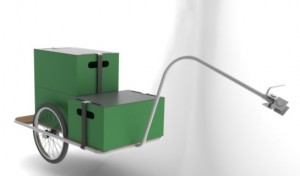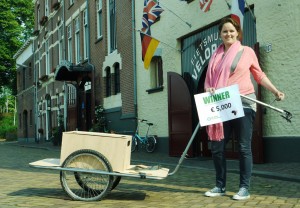
The team from the Delft University of Technology won the African Bicycle Design Contest last Friday with a simple trailer design which features a modular box system to keep the cargo secure and separated. The idea for the modular containers was based on the team’s research into the transportation needs of local farmers and fishermen as well as the workflow of the current boda-boda (bicycle taxi) drivers. The simple modular trailer solution allows the boda-boda drivers to easily combine trips while keeping the various cargo loads (crops, fish, water, etc.) separated. Faster and safer transport means more income for the farmers and fishermen as well as for the boda-boda drivers, who are able to expand their business to include more cargo transport in addition to passengers.
The team put together a great presentation documenting their research, development, and proposal for implementation. Part of their business plan is to set up a “boda-boda association” which will handle the logistics of pick-ups and deliveries like a central courier service. By combining trips in nearby areas, and maximizing the efficiency of their routes, the boda-boda drivers can make more money and customers can receive goods (often perishable goods) faster. In addition to administration, the association will also function as a central hub for bike and trailer repair.

Unfortunately, the team did not put as much time into their final prototype, which was quite rough and will need to be developed further. The jury was able to overlook the deficiencies in the prototype though based the team’s understanding of the transportation needs of the local people and their proposed solution for addressing those needs within the framework of the Kenyon economy.
As a member of the jury (judging the proposals from afar), this trailer concept was not my top choice, but I am coming around the more I consider it. From a design standpoint, the Delft team trailer was not the most exciting entry (in my opinion), but it was well thought out and feasible to implement quickly using local material and labor resources. After seeing the team’s presentation last Friday, the other jury members summarized the reason for picking this concept:
“The reason that this team has won the competition is because it scores well on context analysis, business proposal and affordability. It’s not only a nice product design, but also the business-case is well developed regarding the African context. A bicycle trailer isn’t very sophisticated or innovative, but above all simple, sustainable, affordable and it meets the demands of African families. According to the jury that’s the right mix for a successful product for the ‘bottom of the pyramid’ in Africa.”
I encourage you to read more about the winning entry, and see the concepts from the other finalists, in the African Bicycle Design Contest Jury Report Finals document. The TU Delft team will now travel to Kisumu, Kenya to refine the final design, train local mechanics, and start production of their trailer in the Cycling Blue Workshop. The idea is to set up the business plan and production so that it can continue locally long after the student team leaves Kenya. I’ll be looking forward to seeing how the Delft team project evolves from this point, and I will follow up in a future post once it is up and running.
By the way, the winning team is not the only one that is moving forward with their concept. Even though they didn’t win, the team from Michigan Tech also plans to implement their business plan in Kenya under the leadership of one of the participating students. More about that in a future post, but I really do hope that all of the teams will consider continuing the work that they started for this competition. There are certainly many people in Africa who could benefit from these ideas, so it is good to know that the final award presentation was really just the beginning.

Leave a Reply